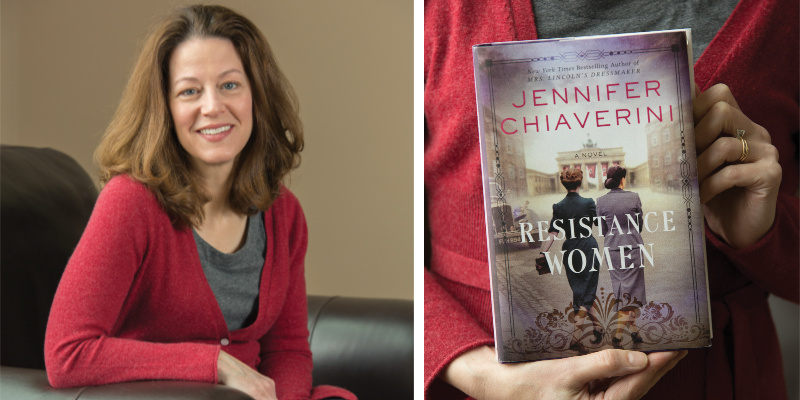By Laura Anne Bird | Photography by Valerie Tobias
The author of BRAVA Book Club’s first pick tells the story of Nazi resisters with ties to Madison.
Madison-based New York Times bestselling author Jennifer Chiaverini has written an astounding 29 novels. (Her thirtieth — “Mrs. Lincoln’s Sisters” — will be published in June.) She is revered for her Elm Creek Quilt series and deeply researched historical fiction.
“I love bringing little-known or forgotten historical figures to the forefront,” says Chiaverini. “Women and people of color have too often been relegated to the margins and footnotes, if they make it into the narrative at all.”
Chiaverini’s latest novel, “Resistance Women,” introduces readers to a spirited Wisconsinite who stood up for the persecuted during World War II, putting herself directly in harm’s way.
What inspired you to write “Resistance Women”?
Several years ago, I came across a notice from the Wisconsin Humanities Council that included a photo of a blond woman bundled up in a warm coat before a stand of evergreens. “September 16 is Mildred Harnack Day,” the caption read, “the day Wisconsin remembers the Milwaukee woman who holds the tragic claim as the only American woman executed on direct orders of Adolf Hitler.” The contrast between the grim words and the woman’s gentle smile captured my imagination.
What was Mildred’s connection to Madison?
Mildred and her husband, Arvid, spent some of their happiest years in Madison in the 1920s. Many of their most cherished memories were set at some of my own favorite places—the UW campus, State Street and Picnic Point.
Mildred and German-born Arvid moved to Berlin in 1929. She grew increasingly dismayed by the malevolent populism that threatened to destroy everything she loved about Germany. How did she respond? Mildred, Arvid, their fellow UW alumna Greta Kuckhoff, and their circle of American and German resistance fighters were called the Rote Kapelle (Red Orchestra) by the Gestapo because of the treasonous “music” (crucial military and economic intelligence) they radioed to enemies of the Reich. They were not trained spies or armed soldiers, but they risked everything to fight injustice.
What do you find most remarkable about Mildred’s resistance circle?
At a time when the Third Reich vigorously strove to limit women’s roles to kinder, kirche, küche (children, church, kitchen), nearly half of the Rote Kapelle were women. They assumed responsibility for collecting intelligence, acting as couriers, distributing leaflets, concealing radios, sheltering fugitives and more.
You dedicated the book to “the resistance women, past and present.” What does it mean to be a resistance woman in 2020?
The resistance women of today refuse to accept or to ignore oppression, inequity and injustice in their neighborhoods, our country and the world. They show up, stand up and speak out on behalf of themselves and others when human and civil rights are threatened.
What books and authors do you enjoy most?
When I read for pleasure, I prefer historical fiction. That said, I’d never limit myself to a single genre—not when there are so many wonderful books just waiting to be discovered. Some of my favorite authors are Jane Austen, Margaret George and Mary Doria Russell.
To participate in BRAVA Book Club’s discussion of “Resistance Women,” visit Facebook and type in “BRAVA Book Club” in the search bar to join the group.




